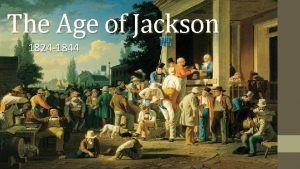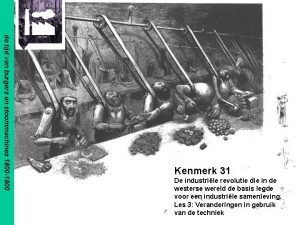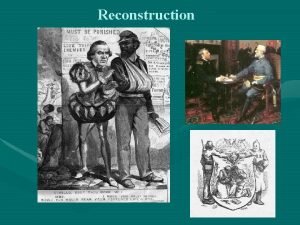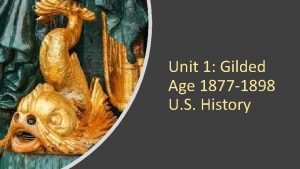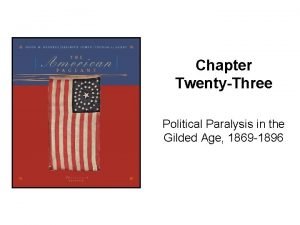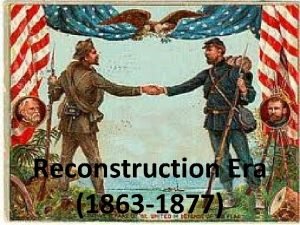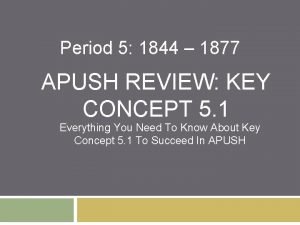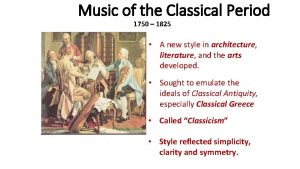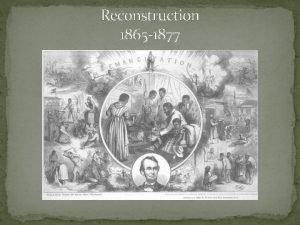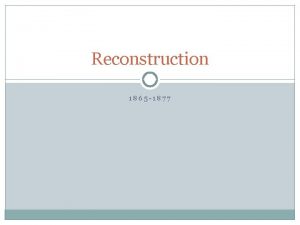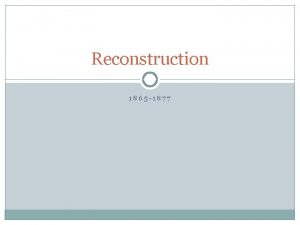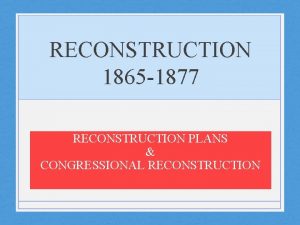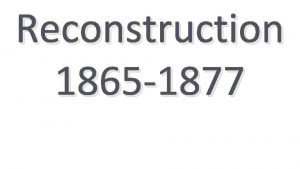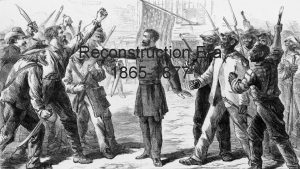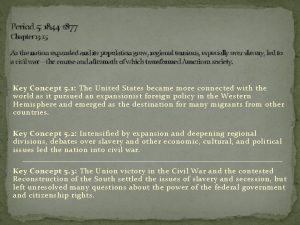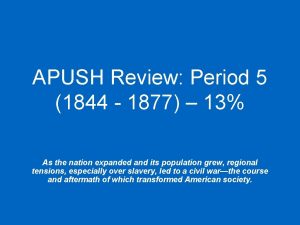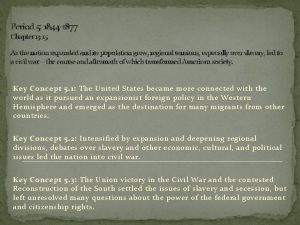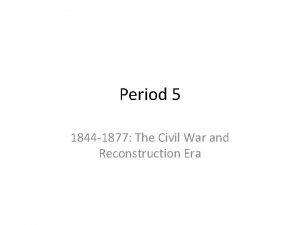Reconstruction Period 5 1844 1877 As the nation














































- Slides: 46

Reconstruction

Period 5: 1844 -1877 As the nation expanded and its population grew, regional tensions, especially over slavery, led to a civil war - the course and aftermath of which transformed American society Key Concept 5. 3 The Union victory in the Civil War and the contested Reconstruction of the South settled the issues of slavery and secession, but left unresolved many questions about the power of the federal government and citizenship rights (POL - 5) (CUL - 2) (ENV - 3)

Essential Questions -How did the states and federal government change as a result of Reconstruction? -How did the balance of power between Congress and the President change during Reconstruction? -Why did Radical Republicans’ efforts to change southern society ultimately fail? -How was the women’s rights movement affected by the 14 th and 15 th Amendments? -What was the lasting impact of Civil War Amendments?


Problems with the Peace • How to readmit the South (reconstruction)? • How to incorporate the “freedmen”? • How to rebuild the South? • Who would direct Reconstruction? • Other problems –What about Confederate leaders? –What to do about southern economy and agriculture? – • All these problems created resentment

Did all Northerners support civil rights? The Cincinnati Enquirer – “Slavery is dead. The negro is not. There is the misfortune. ”

Freedmen • t 4 million • Emancipation & meaning of freedom –To union lines –Slave owners forced- new thinking –searches –“Exodusters” –Churches for black people –education

Freedman’s Bureau • March 1865 –Food –Clothing –Medical care –Education- Freedmen’s Bureau schools –Officials often corrupt –Expired 1872

“It is not…in your power to fulfill one tenth of the expectations of those who framed the Bureau. I fear you have Hercules’ task. ” -Gen William Sherman to O. O. Howard


Johnson - The Tailor President • Poor southerner • Worked his way up • Democrat who remained loyal to Union • Ran as Lincoln’s running-mate in 1864 • At odds with both Reps. & Dems. during Reconstruction


Johnson -appointed military governor of Tennessee in 1862 -”Damn the Negroes, I am fighting the traitorous aristocrats, their masters. ” -addressing a black gathering in October 1864 – “I will indeed be your Moses, and lead you through the Red Sea of war and bondage to a fairer future of liberty and peace. ”



Presidential Reconstruction • Lincoln’s 10% Plan (1863) –State readmitted when 10% of its voters of election of 1860 took oath of allegiance to US –Had to promise to follow emancipation –Creation of new state govt. • Deep controversy in Congress •

Pres. Reconstruction (con’t) Wade-Davis Bill (1864) – 50% of voting pop. take oath –Stronger safeguards for emancipation –Pocket-vetoed by Lincoln

Pres. Reconstruction (con’t) • Differences b/t radical & moderate Republicans –Uproot structure of south –Believed Johnson would support them • Johnson’s plan for reconstruction closer to Lincoln’s –Disfranchised wealthy confeds. - had to ask him for a pardon –State conventions to ratify 13 th Amendment, repudiate confederate debt, & officially repeal secession

Black Codes • Post-emancipation slave system- Mississippi (1865) –Ensure labor force –Restore pre-Civil War race relations (make blacks 2 nd class citizens) • Threw black farmers into sharecropping- tied them to the land economically • Made many northerners wonder what they had fought for *sanctioned by President Johnson


Congressional Reconstruction • Northern Republicans alarmed –Dec. 1865 - ex-confederates showed up in DC to take seats in Congress –Felt they shouldn’t be allowed to take seats 4 former CSA generals, 5 colonels, members of CSA Congress and Cabinet, Alexander Stephens –Republicans. had enjoyed strong majority during war –Southern states would get more reps. (12) in Congress & more electoral votes –Dec. 6, 1865 - Johnson declared southern states reconstructed

Johnson and Congress Clash • Johnson vetoed Congressional acts –Freedmen’s Bureau –Civil Rights Act • Overridden • 14 th Amendment –Guaranteed civil rights to freedmen –Reduced a state’s rep. in Cong. if it denied freedmen the right to vote –Disqualified former confederates as officeholders –Guaranteed federal debt, repudiated Confederate debt


Swingin’ Round the Circle • Congressional Elections of 1866 –Johnson wanted members sympathetic to the South –Started his “swing round the circle” tour –Such a bad speaker he helped Republicans get votes • Got better than 2/3 majority- veto-proof



Republican Principles and Programs • Moderates vs. Radicals –Moderates- no policies that took away individual rights –Radicals- keep southern states out of Congress as long as possible, use federal force if needed • Charles Sumner- Senate • Thaddeus Stevens- House • Mods & Rads agreed that black people needed the vote

Reconstruction by the Sword • Reconstruction Act of 1867 - military reconstruction – 5 military districts –Took vote away from 1, 000 s of former confeds. –Had to guarantee vote to adult male former slaves • 15 th Amendment ratified 1870 - black male suffrage • When fed. troops finally left a state the govt. often “redeemed” to “home rule” • Ended officially in 1877


No Women Voters • Women left out of 15 th Amend. • major part in abolition movement –Susan B. Anthony & Elizabeth Cady Stanton –Tried to have the word “sex” added to amend.

Realities of Reconstruction • 14 th Amend. - no voting rights • 15 th amend. - 1870 • Union League- improve position • Black senators & reps. (Hiram Revels, Blanche Bruce) • Graft & corruption

Religion -most black political leaders built a base in the church -Frederick Douglass was the exception -repudiated mystical, evangelical rhetoric -over 100 black ministers elected to legislative seats during Reconstruction -used biblical imagery in speeches

Scalawags and Carpetbaggers

Ku Klux Klan • TN, 1866 - club of ex-confeds. • Became violent terrorists as Reconstruction moved on • Force Acts of 1870 & 1871 - federal troops • Literacy tests

Governor Holden - NC -First US Governor to be impeached -John Stephens

Impeachment of Johnson • Tenure of Office Act- 1867 • Johnson violated in 1868 • House voted to impeach

NOT GUILTY • Johnson violated TOA as a test • Thaddeus Stevens a prosecutor • Vote fell one short of removal – 7 Republicans had voted not guilty –Would have been a dangerous precedent –Most didn’t like the next in line (B. Wade) –Johnson indicated he’d stop obstructing Rep. legislation

Seward’s Folly • Russia ready to sell Alaska • 1867 - Sec. of State William Seward made the deal with Russia –$7. 2 million ($. 02/acre) • Hope for resources in Alaska

Cruikshank decision -arose from Grant administration’s effort to punish Colfax Massacre in Louisiana -clash between White Leaguers and freedmen loyal to gov’t on Easter Sunday (1873) -73 whites indicted - 9 tried - 3 convicted - overturned by Supreme Court -Cruikshank - 14 th Amendment applied to state action, not individual citizens

End of Reconstruction -Compromise of 1877 -Followed disputed election of 1876 between Hayes (Republican) and Tilden (Democrat) (disputed votes in Florida, Louisiana, SC) - Commission of 5 Senators, 5 Representatives, and 5 Supreme Court Justices voted 8 -7 to certify returns giving election to Hayes



Legacy of Reconstruction • Huge resentment toward North • No clear plan for Reconstruction • Must be considered a failure –Only temporary benefits to blacks –Moderates didn’t understand the protections needed for black rights –Deep racism & indifference to the plight of blacks

Views on Reconstruction -Early 1900 s - William A. Dunning - Reconstruction was a national disgrace and a failure - too many rights for African-Americans too soon - rationale for early 20 th Century racial segregation - The Birth of a Nation

Views on Reconstruction (con’t) -1930 s - John Hope Franklin and WEB Du Bois - highlighted achievements of Reconstruction governments and black leaders - added to by Kenneth Stampp post-WWII - said Reconstruction was noble experiment but ultimately failed -1970 s - Michael Benedict and Leon Litwack - scrutinized motives of Northern politicians after Civil War

Views on Reconstruction (con’t) -1980 s - some historians criticized Congress for not being radical enough and not prolonging military occupation of the South -Eric Foner - acknowledged limits of Reconstruction - pointed out freedmen established many long lasting institutions in African-American community - took a “ 2 nd Reconstruction” after WWII (civil rights movement) to recognize promise of 1 st Reconstruction
 Henri julien rousseau
Henri julien rousseau Joint stock companies act 1844
Joint stock companies act 1844 Buchingham palace
Buchingham palace The age of jackson 1824-1844
The age of jackson 1824-1844 Guided reading & analysis: the age of jackson, 1824-1844
Guided reading & analysis: the age of jackson, 1824-1844 1844 eerste telegraaflijn
1844 eerste telegraaflijn Prantsuse poeet 1844-1896
Prantsuse poeet 1844-1896 Anjo 1844
Anjo 1844 Prantsuse poeet 1844-1896
Prantsuse poeet 1844-1896 Theories of origin of state
Theories of origin of state Country vs nation
Country vs nation State vs nation
State vs nation The term reconstruction refers to
The term reconstruction refers to The gilded age 1877 to 1898 worksheet answers
The gilded age 1877 to 1898 worksheet answers Compromise of 1877
Compromise of 1877 1877 golden 1
1877 golden 1 1894 railroad strike
1894 railroad strike The great railroad strike of 1877 was provoked by
The great railroad strike of 1877 was provoked by Tanssija 1877-1927
Tanssija 1877-1927 1877 to 1918 cloze notes
1877 to 1918 cloze notes The key tradeoff featured in the compromise of 1877
The key tradeoff featured in the compromise of 1877 1877-1865
1877-1865 Reconstruction art definition
Reconstruction art definition Anthony comstock apush
Anthony comstock apush Joseph pulitzer apush
Joseph pulitzer apush Whats the compromise of 1877
Whats the compromise of 1877 Period 2, atomic mass 11
Period 2, atomic mass 11 Written records in history
Written records in history A&p flix activity: generation of an action potential
A&p flix activity: generation of an action potential Critical/sensitive periods
Critical/sensitive periods Period of activism in philippine
Period of activism in philippine Critical period vs sensitive period
Critical period vs sensitive period Is hyperpolarization the same as refractory period
Is hyperpolarization the same as refractory period Stability period vs measurement period
Stability period vs measurement period Classical music has less complicated texture
Classical music has less complicated texture Critical period vs sensitive period
Critical period vs sensitive period Trustee period and royal period
Trustee period and royal period Critical period vs sensitive period
Critical period vs sensitive period Bổ thể
Bổ thể Thiếu nhi thế giới liên hoan
Thiếu nhi thế giới liên hoan Sự nuôi và dạy con của hươu
Sự nuôi và dạy con của hươu điện thế nghỉ
điện thế nghỉ Thể thơ truyền thống
Thể thơ truyền thống Các châu lục và đại dương trên thế giới
Các châu lục và đại dương trên thế giới Bài hát chúa yêu trần thế alleluia
Bài hát chúa yêu trần thế alleluia Bảng số nguyên tố lớn hơn 1000
Bảng số nguyên tố lớn hơn 1000 Fecboak
Fecboak




